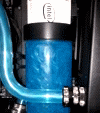-
Posts
384 -
Joined
-
Last visited
Awards
This user doesn't have any awards
Profile Information
-
Gender
Male
-
Location
UK
-
Interests
3D Modeling
System
-
CPU
3700x
-
Motherboard
MSI B460 Pro Carbon AC
-
RAM
16GB G-Skill 3000Mhz
-
GPU
2x Aorus Xtreme 1080Ti NON SLI
-
Case
Phanteks P400
-
Storage
Samsung 850 Evo 250GB + Seagate 4TB
-
PSU
Corsair TX850
-
Display(s)
Acer X34
-
Cooling
EK Full Nickel CPU + EK Full cover GPU + 360 Magicool + Magicool Res / Pump Combo
-
Keyboard
Ducky Shine 3 TKL (Brown)
-
Mouse
Logitech G203
-
Sound
KEF Q300 + Sony DH820 / Philips Fidelio X2
-
Operating System
W10
Recent Profile Visitors
1,021 profile views
roughavoc's Achievements
-

I REALLY Wanted to Try This... Samung NEO QLED Mini LED TVs
roughavoc replied to jakkuh_t's topic in LTT Releases
Whilst I understand it's for the video and the display is just a good display regardless. Blade Runner 2049 isn't a HDR film, even in HDR mode. It doesn't have any highlights over 200nits so no TV should have issues showing what is basically a SDR film. -
TLDR: Dell G5 RTX 2060 has less latency compared to 1080Ti desktop (30ms vs 45ms) Why / How? I own an LG C9 and a GTX card so I haven't tried G-Sync, today I used an RTX Laptop to test G-Sync and noticed when I was using laptop it felt good amount snappier, I thought it was the mouse but I changed those over and felt the same, I also changed the HDMI cable over, port on TV and port on PC, settings on the TV. Basically everything I tried the laptop always felt significantly snappier So I used my phone to record 480FPS video where I hit the mouse and recorded the time between the mouse moving and the cursor on screen changing: System - 60hz - 120Hz Laptop - 29ms - 12ms PC - 46ms - 33ms (This was an average (the delta was 1ms so very consistent) of 5 tests) So my question, why? How do I fix? Thanks
-
Thanks, was expecting that to be the case
-
Setup: GPU HDMI -> AV Receiver -> Speakers Just a quick question, what is actually happening when I adjust the volume within windows? is it applying a software volume adjust before it sends the digital output to the AV receiver?
-
Bought two of BL2K8G36C16U4R (2 x 8GB CL16 3600Mhz) System 1: MSI B450 Pro Carbon AC + 3700x System 2: MSI B450 Tomahawk Max + 3600 Existing RAM: G-Skill 4 x 4GB CL15 3000Mhz - this works in both of the above systems fine All 4 sticks of the 3600 causes both of the systems not to boot, they don't even post Both motherboards have the CPU Debug LED showing I then went through the very fun process of trying every single stick in every single slot in both of the systems, every single combination = PC doesn't boot I'd be more understanding if I bought a single kit of 4 sticks or if I was just testing in one PC, but two different packs of 2x8GB and all of the sticks don't work in two different PCs, surely that is impossible odds at this point? Before stupid questions are asked, yes BIOS newest version + fresh BIOS reset, The systems work with other RAM and yes I let it fail at training memory via waiting and resetting the PC a few times.
-

System sometimes not booting as if unstable
roughavoc replied to roughavoc's topic in CPUs, Motherboards, and Memory
And to make matters even more confusing, Using Ryzen DRAM Cal. I can boot 3200Mhz CL17 no problem, but I haven't got around to leaving it to do a long HCI Memtest to see if it is actually long term stable so I haven't been in Windows with those settings for very long -
Ryzen 1700x + B350-F + F4-3000C15Q-16GRR So I have never really had great times with the RAM, I expected it as 4 sticks non samsung b die but o well I enable DOCP and it will only boot when set to 2666Mhz instead of 3000. I felt like that was good enough for a while so left it like that. A few BIOS updates later and I thought maybe I could push it further, tried 2800Mhz and it works fine (or so I thought) So running HCI Memtest it got to 400% without a single error so I called that stable, but sometimes it will fail to boot even into the BIOS, just restarts 3 times and then uses safe bios settings where I just put the settings back to 2800Mhz etc and it boots fine So what is the issue here? Once the system has booted the RAM is stable but why would it sometimes fail to boot whatsoever? I've set the RAM Voltage to 1.36v and SOC to around 1V (This mobo only supports offset voltage so I just gave it a 0.025v boost as sometimes it says its at .875v or 1.125v)
-
Drivers.. I didn't even think about that... I guess another question would be, is there a way to limit a program's GPU usage? Like you can limit FPS or core affinity, is there a way to do that for GPUs?
-
The CUDA processing isn't the issue, V-Ray already has that option
-
The situation: I do 3D work and when it comes to rendering, I use V-Ray RT CUDA which uses 100% of my GPU which causes the entire system to lock up and for look development it is very annoying having my cursor lag and skip around the screen whilst it is rendering away. The software has an option to put it on low thread priority but the issue is that it reduces the performance of the rendering by an amount it is quicker to just use CPU rendering which defeats the point Here is what I want to do: You can solve the whole system lagging to a laggy mess by using a separate GPU for the rendering and one for Windows, that is fine as I have a GTX 460 sitting here collecting dust The issue I think I'll face: If I plug both GPUs in and connect the screen to the 1070 I have haven't done anything, the system will still be laggy as the one GPU is still doing the rendering as well as the Windows UI. BUT if I plug the screens into the GTX 460 it should work all fine. But what happens when I want to game? Will I be limited to using the GTX 460 level of performance? or is there a way to route the processing from the GPU somehow through the GTX 460 videos output? or will I have to actually change the cables every time I wanna play something?
-

Two of the same model HDD, very different speeds
roughavoc replied to roughavoc's topic in Storage Devices
The drives are 2 months old, both 1% fragmented I guess I have just lost the luck game -

Two of the same model HDD, very different speeds
roughavoc replied to roughavoc's topic in Storage Devices
Standard ones that come with the motherboard, both new cables (Z87 / B350) so it shouldn't be those : ( -
Me and my brother both have a Seagate ST400DM004 (4TB) drive in our systems, both have roughly the same amount of data written, same hours powered, same basically everything The issue is when I run any hard drive benchmark software, lets go with CrystalDiskMark for now His Drive -- My Drive What could be the reasons for the difference in speeds? I know it isn't the platform as his system is my old system and my speeds haven't changed since going from Intel to AMD.
-
For the rest of the log could u tone down the vignette about 99% 8)







